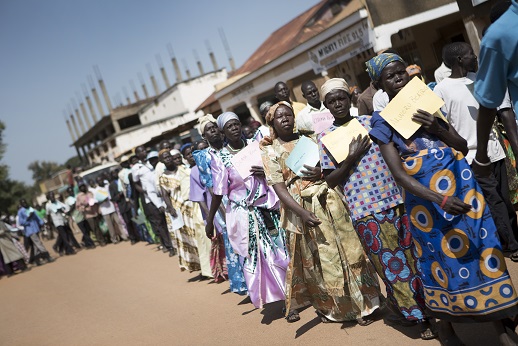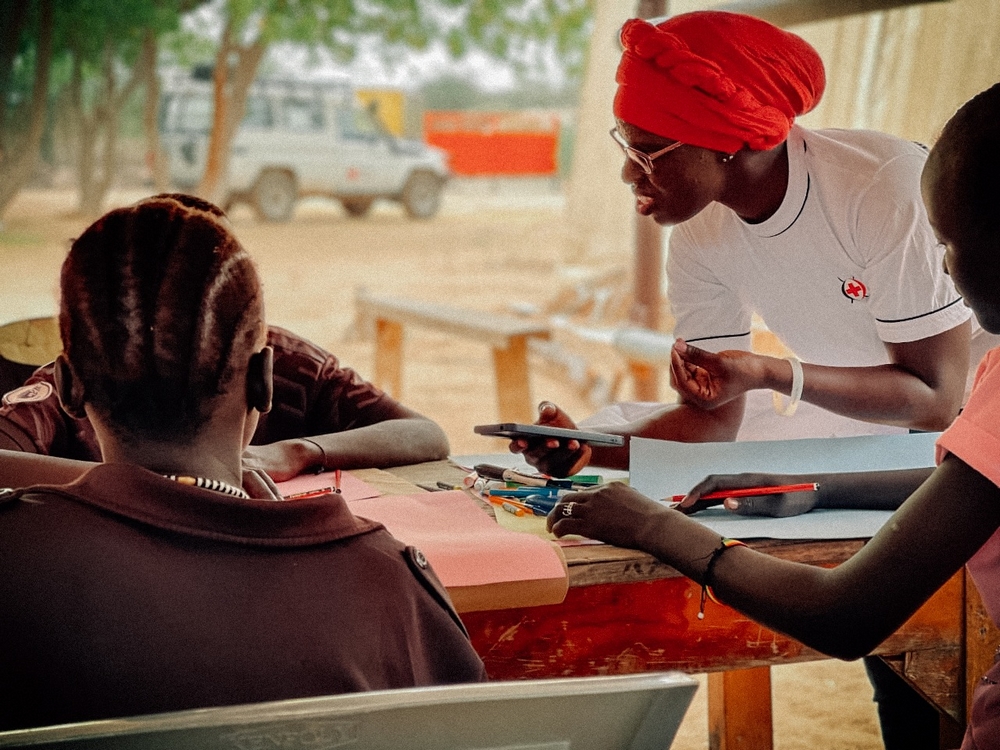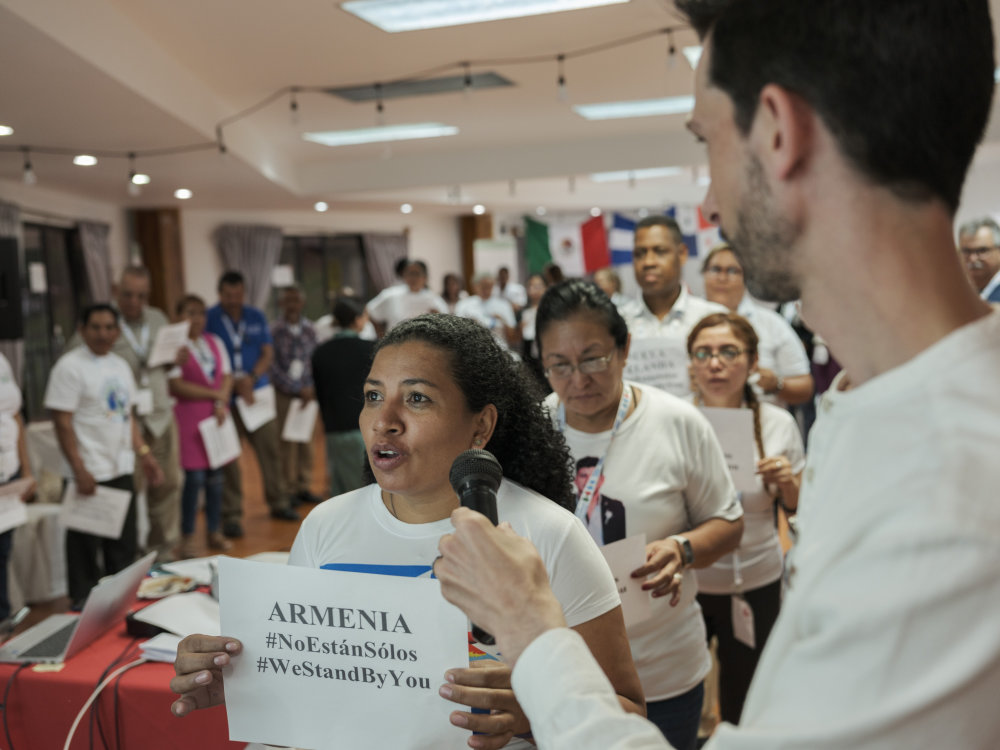As the Franco-Prussian war raged on 150 years ago, wounded soldiers from both sides receiving treatment in a Red Cross reception area in Basel, Switzerland, eagerly asked for their families to be informed of their whereabouts as soon as possible. Postal lines had been cut and they knew that without news, their families would live in anguish not knowing if they were dead or alive.
This situation, as well as the encounter years earlier at the battle of Solferino between Henri Dunant and the fatally wounded Corporal Claudius Mazuet – who pleaded with Dunant to ensure that his parents be informed of his fate – led to the creation of what is now called the Central Tracing Agency. The Agency is an integral part of the ICRC. Its mandate is grounded in the Geneva Conventions of 1949 and is also based on the Statutes of the Red Cross and Red Crescent Movement and resolutions of the International Conference. It is a neutral entity – a place where information on the whereabouts of people can be kept safe and transmitted securely if they so wish, regardless of who they are.
The ICRC’s Central Tracing Agency and the network of Red Cross and Red Crescent National Societies around the world have helped millions of people restore contact with relatives lost, stranded or detained during armed conflict, other situations of violence and disasters. As a neutral intermediary and a source of expertise, the Central Tracing Agency has also supported the efforts by authorities, for instance, to establish adequate legal and institutional frameworks to prevent and respond to cases of missing persons, to process information on missing persons and those at risk of going missing, and to identify and where possible return the remains of those who died so their families can mourn them.
The experience of families of missing persons is sobering and humbling in many ways. Their individual stories are compelling in their own right, but they are also ‘vignettes’ of a larger history of war and peace, often still in the making. Here are three important things we can learn from their experience which are relevant to a broader reflection on war and on the difficult pathways towards peace:
1. Families of missing persons show us how individual experiences coalesce into a collective cause.
One of the most striking aspects of the experience of many families of missing persons is how the need to find answers passes from generation to generation. It shapes family history and identity, creating a ‘witnessing generation’ which carries the traces of their parents’ and grand-parents’ trauma.[1] As the niece of a missing person once explained to the ICRC: ‘This still leaves a heavy mark on the second generation. We have a corporal memory. This issue stays in our blood. It’s a link to the previous generation’.
Beyond a single family, cases of missing persons shape relationships within societies affected by conflict and violence. Around the world, ICRC delegates have seen families of missing persons struggling to regain their place in their community, not only due to the suffering associated with having a missing relative, but also to social status and stigma – women whose husbands have been absent for decades and who are neither part of the ‘married world’ nor of the ‘widows’ world’, who often cannot exercise parental and property rights fully, or families eyed with suspicion as others in the community speculate as to why their relative went missing and whose ‘side’ of the war they were on. For families, this has created situations of isolation and social exclusion. But we have also seen examples of solidarity where individual suffering became a collective cause – or at least a shared cause. From Argentina to Sri Lanka, Mexico to Uganda, Nepal to Kosovo, peer-to-peer support groups have brought families out of their isolation and enabled them to rebuild their lives while coping with their ‘ambiguous loss’.
Associations of families of missing persons can be another example of the trajectory of an individual pain to a collective cause. In July 1998, associations of wives of missing people from Srebrenica gathered in Goražde, on the bridge over the Drina river where, three years earlier, the bodies of victims of the Srebrenica massacre had been carried along by the river and passed underneath. The ceremony brought individuals into a collective bond and gave them a place in their community and in their society as families of missing persons. Family associations are also key stakeholders for authorities in search efforts, legal reform processes, and in the establishment of domestic institutional frameworks to address the question of missing persons. Their role transcends the individual stories of their members and acquires a societal dimension – it shapes the way a country deals with a part of its past.
2. Families of missing persons show us the importance of inclusivity in helping (re)build trust.
The trajectory from individual experiences to collective memory can unite or it can antagonize, depending on how it is handled by families of missing persons individually and collectively, as well as by authorities. Here again, the role of family associations gives us a good insight into a spectrum of community dynamics.
In some contexts, family associations have forged lines of dialogue between different ‘sides’ of a conflict. Grazina Baranowksa, who has undertaken research on intercommunal dialogue in Kosovo and Cyprus, suggests that ‘families are prone to support any action that will reveal the fate of their loved ones; therefore, if they are convinced about the necessity to cooperate with the other side, they are supporting the cooperation’. Dialogue may at first be transactional – family A can help family B find answers on a missing relative – but sometimes evolves into a mutual acknowledgment of the suffering of one another. Short of fostering reconciliation, the step of humanizing the ‘other’ is important for rebuilding trust.
On the opposite end of this spectrum, we can sometimes see antagonistic dynamics whereby different groups of victims try to find their place in the collective memory of past events. This can perpetuate grievances long after the conflict and violence have ended. The antinomy and sometimes rivalry between larger and smaller groups of victims in a country’s historical memory is a common feature of many contexts affected by conflict and violence. It has plagued some post-World War II societies and institutions in Europe for instance.[2] One can only think of the great challenges ahead for other societies and institutions more recently affected by conflict, such as Iraq and Syria.
There is no exact science as to how peace can be achieved and sustained, but research indicates that many conflicts have their roots in grievances related to exclusion. A certain course is inevitably set within the broader landscape of grievance formation, depending on whether authorities address the needs of families of missing persons selectively or – to the contrary – inclusively and without discrimination.
3. Families of missing persons show us how preventive action and reliable institutions are key for safeguarding and restoring citizen-State trust.
Building or restoring trust after an armed conflict is a challenging, complex and long process often plagued with setbacks, stalled or halted altogether when conflicts flare up again. Such a process requires addressing a multitude of grievances and issues – displaced persons, detainees, land rights, discrimination, reparations, justice and many more. While no single issue alone can entirely rebuild trust after violence ends, the question of missing persons has featured in political processes to end conflict and in peace agreements. Some examples include the Dayton Agreements on Bosnia and Herzegovina, the Comprehensive Proposal (Athisaari Plan) in relation to the conflict in Kosovo, the Riyadh agreements and several Security Council resolutions in the aftermath of the 1991 Gulf war, or the recent Colombian peace agreement. The question of missing persons has also been a feature of transitional justice processes, for instance in the Gambia, Peru, South Africa and Sri Lanka.
Whether or not it creates a basis for peace, failing to address the fate of missing persons without discrimination is likely to perpetuate grievances within the society. This is not only because of the open wounds that unresolved cases leave and how these wounds shape families and entire communities. It is also because the question of missing persons requires action by the authorities, regardless of the circumstances in which people went missing. In any circumstance, elucidating the fate and whereabouts of missing persons and providing support to families requires an adequate legal and institutional domestic framework which only governments can put in place; information needs to be collected, analyzed and transmitted; families need an appropriate legal framework to be able to exercise their rights in the absence of their relative; permits and court orders need to be given for exhumations to be carried out, etc. Without the authorities and political will, none of these measures are possible.
Even where there is willingness by authorities to address cases of missing persons during armed conflict, it is not necessarily easy to move forward because it often involves cooperation with other parties. Armed conflicts often lead to cases of missing persons on all ‘sides’ and the willingness to engage with individuals, communities or authorities who are perceived as responsible is often difficult. In various countries, the establishment of national and multilateral mechanisms to address cases of missing persons created an enabling environment for dialogue and cooperation between different sides of a conflict and between affected communities and the authorities. The United Nations Security Council underscored the importance of such mechanisms in Resolution 2474 (2019) and the need to strengthen their role and capacity. In some cases, mechanisms involving different parties require the help of a neutral intermediary. This is a role which the ICRC has fulfilled multiple times as part of its mandate. A neutral intermediary cannot restore the trust that an armed conflict has damaged, but it can help in bridging the gap sufficiently to bring opposing sides together in an attempt to clarify the fate of missing persons. Similarly, while such mechanisms are not responsible for restoring trust within communities and between communities and authorities, every time a family learns what happened to their loved one, then one important need and expectation is fulfilled. This can perhaps prevent a further erosion of trust and an entrenchment of grievances towards the authorities, especially if families are included in the process itself.
Accounting for missing persons and responding to the other needs of their families can only ever be one side of the coin. The other is prevention. Both international humanitarian law and international human rights law contain relevant obligations for the prevention of cases of missing persons (and for the clarification of their fate). Putting in place the right legal and institutional frameworks domestically and planning already during peacetime is key for preventing persons from going missing. These frameworks include: National Information Bureaux and Grave Registration Services in case of international armed conflict, protocols for the proper management of the dead, and the systematic registration of all persons deprived of liberty and the facilitation of contact with their families. Having adequate and effective legal and institutional frameworks to prevent (and respond swiftly to) cases of missing persons during conflict and violence is also an important signal of political will, and a key avenue to safeguard and (re)build citizen-State trust.
***
Wars destroy trust and tear apart families and communities. They take an enormous toll on those living through them. And even when hostilities end, the suffering endures.
It is difficult to imagine the stressful impatience of a family waiting to receive a letter from a wounded soldier in the Franco-Prussian war. The methods and tools still evolving today are vastly different from the first days of the Central Tracing Agency, and build upon a long history of preserving and re-establishing family links and responding to cases of missing persons. What has not changed and will remain the same is the families’ need to know and the central question: ‘where are they’?
Therefore, special attention needs to be paid to the way the question of missing persons is addressed by authorities, parties to the conflict, communities and all other stakeholders – how early, how preventively, how inclusively. This is not only to the benefit of affected families. It is also to prevent the formation and entrenchment of grievances, to the benefit of entire societies, now and in the future.
How States and parties to the conflict choose to address the issue of missing persons will shape the fabric of many societies long after the guns fall silent.
[1] There have been particularly intense debates on this issue among philosophers, historians, politicians in the post-World War II period and beyond. One can think for instance of the works of Paul Ricoeur, Tzvetan Todorov, Emmanuel Kattan on the question of memory, “abuse of memory” and “duty to remember”, or of Jean-Michel Chaumont’s “competition between victims”.
[2] Kaiser, S., Postmemories of Terror: A New Generation Copes with the Legacy of the “Dirty War”, Palgrave Macmillan, New York, 2005.
See also
- Ellen Policinski, The Missing: What’s in this edition of the Review, July 2, 2019
- Kvitoslava Krotiuk, Memory and war: does time really heal?, December 17, 2019







Comments